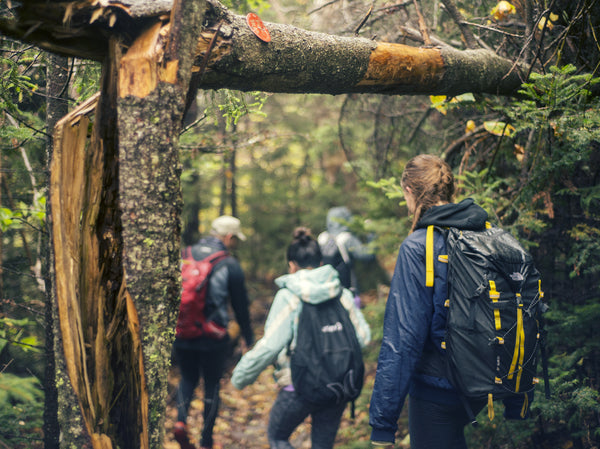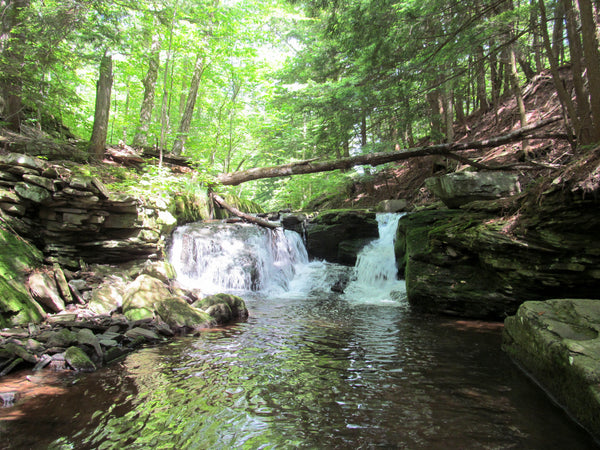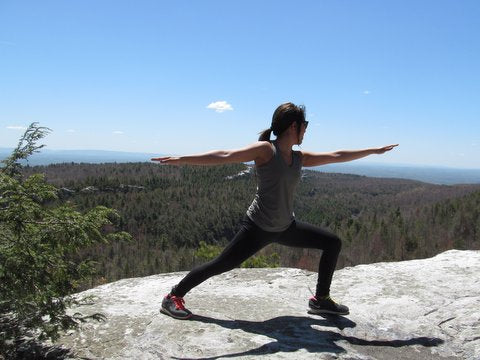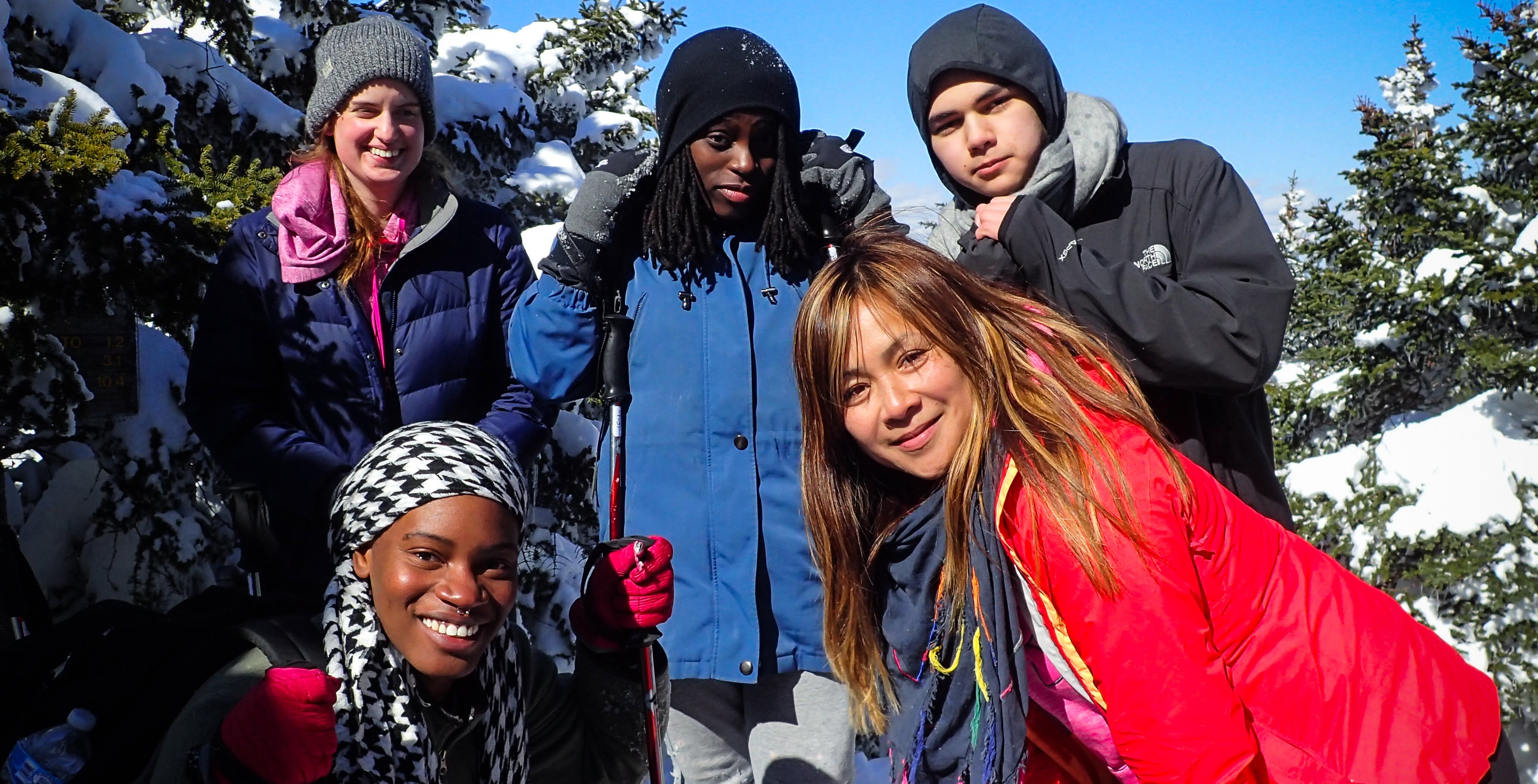Yoga Will Make You a Stronger Hiker
There’s a moment when you see the break in the trees. You push past the last patch of spruce fir, and take the final few steps of the 5.2 miles and 1500 feet of elevation gained behind you. Finally, you see the valleys of the Catskills stretching out in all their magnificent beauty before you.
For many of us, this is why we hike. We push past the fatigued quads, aching joints, and strained backs to the summit, where the splendor of the view in front of us makes everything else fade to nothing.
The next morning--it might be a different story.
We coax our spent calves into animation, knowing that the glorious hours spent hiking through hemlock-shaded groves sprinkled with trillium are worth the morning struggles.
We would like to offer you a better solution. While tough hikes are usually a welcoming challenge they don't need to be so hard on you; your body does not need to be out of commission after a strenuous day on the trail.
There are many ways to ensure that your body stays supple and ready for a good hike, and yoga is a perfect fit for outdoors enthusiasts. Adding a yoga practice to your exercise routine and intermittently throughout your hike can have a tremendous impact not only on your body’s ability to recover, but can also improve your hiking performance and prevent injuries on the trail. More and more athletes are turning to yoga as they find it complements their sport, and helps them gain flexibility, improve their performance, speed up muscle recovery, and prevent injury.

Why Hiking Hurts so Bad
One of the greatest benefits, and challenges, of hiking is that it is both an aerobic and anaerobic exercise. This means that your body needs to be able to access and use oxygen and glycogen (stored carbohydrates in the muscles) efficiently in order to create fuel for you to move. The movements involved in hiking use repetitive motion along the sagittal plane (forward and backward) that pulls on the same muscles group repeatedly throughout the hours of your trek. With the thousands of steps we take up a mountain, our hips, ankles, and shins are being flexed and extended repeatedly, which also causes our shoulders and neck to round in as we strain to keep moving forward and up.

While a great form of strengthening for your legs and glutes, the nature of hiking is not a well rounded form of exercise and can leave us with tight hips, quads, ankles, and IT bands as well as with a sore back, shoulders, and neck. Yoga can help to not only balance hiking, making it a well rounded exercise, but can also prepare your body to better handle the repeated use of certain muscles.
The Benefits of Yoga for Hikers
Fueling your Muscles:
The yoga asana practice utilizes a controlled and mindful breathe as you move through each pose. This practice is proven to increase lung capacity, opening up your lungs, diaphragm, and chest. This allows you to breathe deeper and to better oxygenate your muscles, which makes them function more efficiently. By providing your muscles with greater amounts of oxygen, you are reducing the need for anaerobic exercise as part of your hiking, lowering the amount of glycogen your body needs, and the amount of lactic acid it produces as a byproduct. In short, that means that yoga will allow your muscles to work more efficiently and effectively on your hike, decreasing soreness on the trail as well as the next morning. Additionally, you will find that having a steady yoga practice in your off season means you will come back for your first hike without a diminished lung capacity.
Flexibility:
Yoga has a reputation for helping people gain flexibility and rightfully so. Yoga builds flexibility by lengthening the fibers of your muscles, and giving elasticity to the surrounding fascia sheaths, tendons, and ligaments. As yoga loosens up the muscles surrounding your joints, it provides you with a full range of motion and full engagement of your muscles, thus decreasing the likelihood of injury due to tightness. For example, an open and flexible hamstring takes pressure off of both your lower back and your knee joint, two areas that can commonly get injured/sore when hiking.
Stability:
Yoga also helps develop balance, stability, and core muscles. It will teach you to utilize horizontal and vertical extension, breathing techniques, as well as your complex system of smaller stabilizer muscles to improve your balance. This will help prevent injury when hiking on rougher terrain or on a more technical hike, leaving you less likely to tweak a knee or sprain an ankle when navigating the rocky terrain we’re all familiar with in the Catskills. Developing these stabilizer muscles in your legs and your core will also allow you to find balance while using better posture, alleviating a lot of the back soreness that can accompany hiking and backpacking.
More Balanced Body:
As we mentioned earlier hiking develops very specific muscles, and uses repetitive movements. If your primary form of exercise is hiking, you are leaving yourself prone to injury, tension, tightness, and body aches. Yoga will balance out your body and provide you with flexibility and strength throughout your entire muscular and skeletal systems leaving you with all of the joys of hiking without the aches and injuries.
Finally, much like the peace of mind you find at the summit of a mountain, yoga brings you internal peace, a better understanding of your body, and respite from the city, much like you find in nature. If you enjoy the benefits of hiking, we think you’ll find the benefits of yoga equally rewarding.
If you want to experience the benefits of hiking and yoga practice together first-hand, you can join us on one of our many summer yoga trips in the Hudson Valley. There are also plenty of yoga courses available in the city and videos for beginners on YouTube. Even just fifteen minutes a day a few days a week can have a huge impact on your flexibility and athleticism.
By Sarah VanDenbergh and Jessica Tackett





